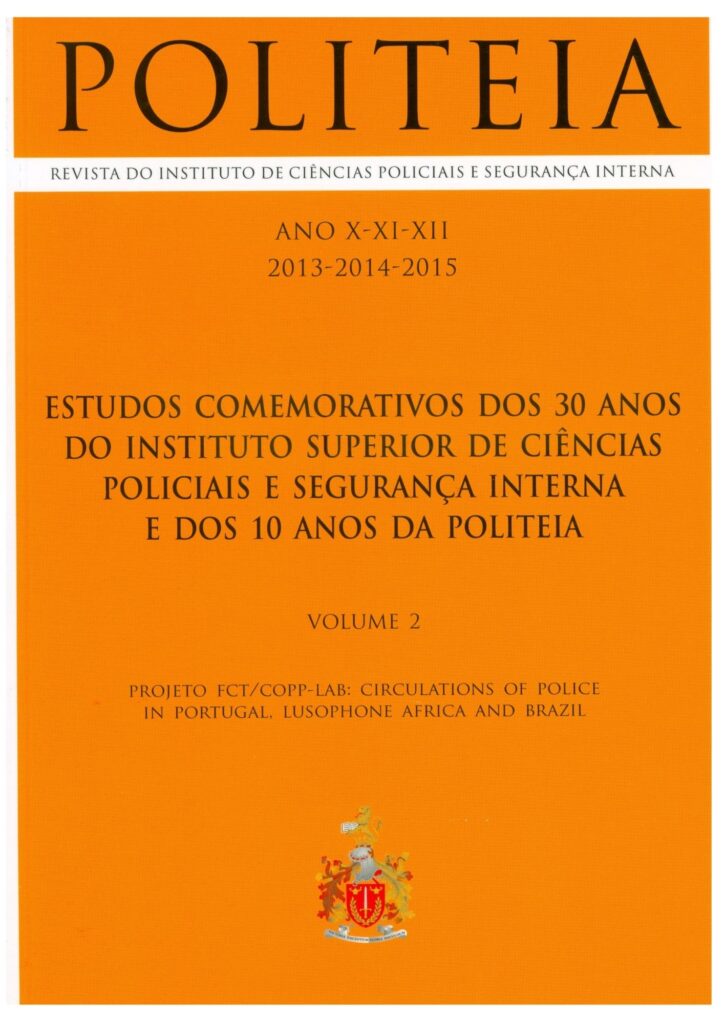Efeitos Possíveis da Cooperação Policial. Oficiais entre Portugal e África
Palavras chave:
O presente ensaio procura delinear uma alternativa interpretativa a críticas fatalistas sobre o Estado e o policiamento contemporâneo pós-colonial em países africanos. Partimos de uma pesquisa realizada junto tanto de alunos cooperantes em formação como de oficiais de polícia africanos formados em Portugal, especificamente no Instituto Superior de Ciências Policiais e Segurança Interna (ISCPSI). Defendemos a ideia de que discursos normativos e reformistas tendem a ser performados por alunos e ex-alunos que obtêm uma formação superior de longa duração que os agrega em comunidades de saber. Os efeitos práticos desta formação individual na condução do policiamento local não são de forma alguma evidentes. Porém, o que a pesquisa indica é que a abertura de avenidas de possibilidades intermédias na mudança de leis, políticas e técnicas policiais não deve ser desprezada.
This essay seeks to outline an interpretive alternative to a fatalistic view of the post-colonial state and policing in African countries. We start from a survey conducted with cooperative African students and officials both trained in Portugal, specifically at the Higher Institute of Police Sciences and Homeland Security (Instituto Superior de Ciências Policiais e Segurança Interna). We defend the idea that normative discourses and reformers tend to be performed by the students and alumni in their long-term higher education in Portugal, which allow them to be part of communities of knowing. Certainly the practical effects of this individual training in the driving of the local policing are in no way evident. But what the research indicates is that the opening of intermediate possibilities in changing laws, policies and police techniques should not be neglected.
Versão original
Versão original
Outros artigos nesta edição
-
Editorial
Manuel Monteiro Guedes Valente
-
Modelos Constitucionais de Polícia e Cooperação na Segurança Interna
Manuel Monteiro Guedes Valente
-
Para lá dos códigos. O papel do Estado e a heterogeneidade do pluralismo jurídico em Moçambique
Sara Araújo
-
Cooperação Internacional para a Formação de Polícias: um caso em Portugal
Susana Durão e Joana Oliveira
-
Efeitos Possíveis da Cooperação Policial. Oficiais entre Portugal e África
Susana Durão e Daniel Seabra Lopes
-
Renovações da Polícia em Angola: cooperação e formação internacional
Cristina Udelsmann Rodrigues
-
Cruzamentos em retorno: Polícias em Lisboa, Praia e Brasília
Joana Oliveira
-
O Modelo de Policiamento Comunitário nos Programas de Educação Policial: uma breve Revisão da Literatura Especializada sobre o Assunto
Paula Poncioni
-
Desafios e Avanços da Política de Formação Especializada de Profissionais de Segurança Pública no Brasil: Reflexões sobre a RENAESP
Ivone Freire Costa, Íris Gomes dos Santos e Anderson Souza da Silva
-
Polícias no Brasil: Entre Passado, Presente e Futuro
Célio Jacinto Santos
-
Diplomacia Policial
Guilherme Cunha Werner
-
Ideias de Chegada e Pontos de Partida. Diplomacia Policial: Formação e saberes
Manuel Monteiro Guedes Valente




